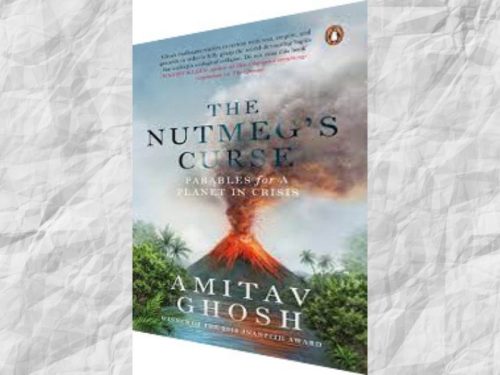Brilliant dissertation: The Nutmeg’s Curse

The Nutmeg’s Curse
Amitav Ghosh
Penguin
Rs.599
Pages 352
To describe this seminal work of exhaustive research and deductive logic as the most insightful and illuminating explanation of the environmental crises threatening Planet Earth suffering floods, famine, pandemics, typhoons, forest wildfires, shrinking polar icecaps — all at the same time — written in the past century, would be an understatement.
The downside of the fascinating subject that is history is that 95 percent are narratives of five American-European countries. These histories are chronicled by White scholars and academics who perhaps unwittingly, permitted deeply entrenched white supremacist academic traditions and racial biases to prejudice their writing.
The great value of The Nutmeg’s Curse is that it is written from a new perspective of a third world non-white scholar, who incisively questions several fundamental assumptions of European civilisation and culture that spread across north and south America to New Zealand and Australia in the east during the past 400-500 years, and currently dominates the world.
According to Amitav Ghosh, a globally respected conservationist and eco warrior, acts of omission and commission of the world’s first predator multinational corporations, notably the Dutch and British East India companies promoted by greedy European elites, are the root cause of the multiple afflictions that have sparked a planetary crisis which could be the beginning of the end of the species homo sapiens.
In this perceptive critique and indictment, the author traces the climate change disaster staring us in the face to the unique nutmeg spice forests discovered in the early 17th century by VOC (Vereengide Oostindische Compagnie), aka Dutch East India Company, in the isolated Banda Islands off latter day Indonesia.
In the 16th century English medical practitioners decreed that the exotic nutmeg peculiar to the Banda Islands, cured victims of plague epidemics sweeping Europe at the time. Consequently nutmegs became so valuable that “a handful could buy a house or a ship”. And with the passage of years, this tiny aromatic fruit became “envy-inducing symbols of luxury and wealth” coveted not only for “materialistic satisfactions that it brings, but because it is desired by others”.
Enter VOC. A monopoly had to be created. Neighbouring islands that hosted nutmeg forests were cleared. The gentle natives who worshipped dormant volcanoes that endowed the air with unique properties and enabled nutmeg forests to thrive, were first brutally tortured as heathen savages and exterminated by armed VOC mercenaries.
The fantastic profits earned by VOC and its stolid burgher shareholders back in Holland inspired the rise of the British East India Company in the 17th century. It replicated the VOC model by establishing spice trading outposts in the Indian subcontinent.
Soon these outposts transformed into “factories” which had to be protected by armed mercenaries. This was followed by negotiating monopoly trading rights and acquisition of territory from local rajas, nawabs and satraps to secure steady supply. Other European maritime powers with ship-building capabilities — Portugal, Spain, France — were quick to adopt this predator model and forcibly site trading centres in Asia and Africa which prompted establishment of spice, tea, rubber, tobacco and indigo plantations. The outcome of this trade-led backward integration model was what the author describes as ‘terra-forming’, i.e, replication of farming practices and land laws of the European model, and ‘colonial settlement’, i.e, encouraging European emigration to the colonies to practice plantation farming, supervise administration and promote business development.
The inevitable outcome was comprehensive upending of native agriculture traditions and practices, and mass displacement of indigenous populations.
Mass displacement, enslavement and in many cases extermination, of native populations was justified by establishment classification of non-white races as not-quite human brutes. This specious, self-serving justification covertly supported by western science, academia and the church — of which capture and enslavement of African tribals to serve as unpaid labour in British America is the most egregious example — became normative in settler colonies. English scholar Lord Macaulay pronounced every British pastor’s home library as infinitely superior to the ancient cultural texts and histories of the Indian subcontinent which a century earlier produced 20 percent of global GDP.
Official brutalisation of third world people which gave full sanction to often low-class colonial settlers to lord it over indigenous populations also conferred upon white settler minorities the right to impoverish, indenture and if necessary to eradicate native populations for business purposes. The most flagrant example of this amoral policy detailed in extenso was in America, where European colonisers systematically decimated indigenous Indian tribes not only through direct violence but also by demolishing their food supplies.
Apart from genocide, European settlers also practiced ‘omnicide’, slaughtering over 100 million buffalo (venerated as a sacred protein source by indigenes), clearing vast forests, introducing European industrial agriculture and livestock farming, while completely destroying the lifestyles and culture of native Indians. The nomadic farming they practiced that allowed soil to regenerate was dismissed as savage and their veneration of the gifts of nature — rivers, forests, mountains — classified as heathen shamanism.
As Ghosh extensively explains, now with extreme climate variations about to overwhelm Planet Earth, it’s clear native Americans and third world savages were right.
European elites conceptualised Planet Earth as an inert, lifeless landmass to be abused and exploited at will by epicurean Western, and latterly third world elites. Deforestation, dammed rivers, industrial agriculture and extractive industries to scoop metals, coal and crude oil from its innards, have damaged fragile ecosystems and aroused the wrath of the Earth’s non-human beings and of the allgiving Mother Earth, aka Gaia, a generous sentient life form. Pushed beyond endurance by continuous exploitation and abuse, Gaia has reacted with fury unleashing a barrage of floods, famines and pandemics upon ingrate homo sapiens.
This brilliant book traces a clear linear cause and-effect connection between greedy European colonialism, genocide of numerous indigenous people, the rise of unbridled extractive capitalism and climate change. It’s a must-read for all engaged in the losing battle to save homo sapiens from extinction.
Dilip Thakore
Also Read:

















Add comment